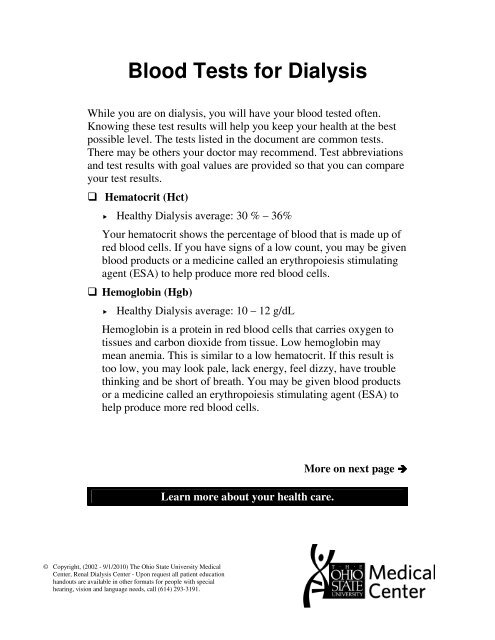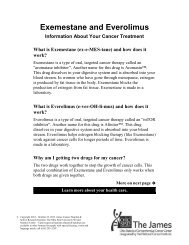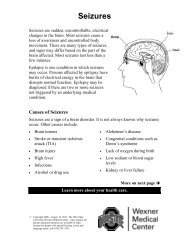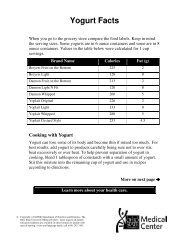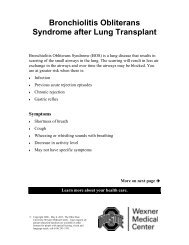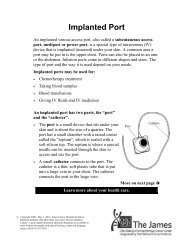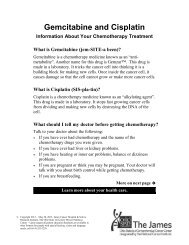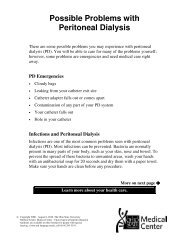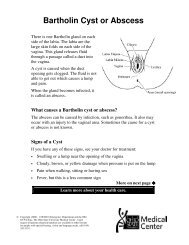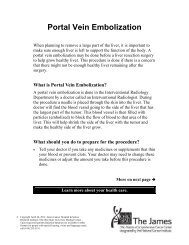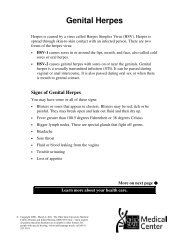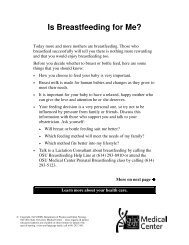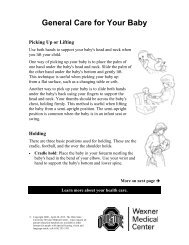Blood Tests for Dialysis - Patient Education Home
Blood Tests for Dialysis - Patient Education Home
Blood Tests for Dialysis - Patient Education Home
Create successful ePaper yourself
Turn your PDF publications into a flip-book with our unique Google optimized e-Paper software.
<strong>Blood</strong> <strong>Tests</strong> <strong>for</strong> <strong>Dialysis</strong><br />
While you are on dialysis, you will have your blood tested often.<br />
Knowing these test results will help you keep your health at the best<br />
possible level. The tests listed in the document are common tests.<br />
There may be others your doctor may recommend. Test abbreviations<br />
and test results with goal values are provided so that you can compare<br />
your test results.<br />
Hematocrit (Hct)<br />
Healthy <strong>Dialysis</strong> average: 30 % – 36%<br />
Your hematocrit shows the percentage of blood that is made up of<br />
red blood cells. If you have signs of a low count, you may be given<br />
blood products or a medicine called an erythropoiesis stimulating<br />
agent (ESA) to help produce more red blood cells.<br />
Hemoglobin (Hgb)<br />
Healthy <strong>Dialysis</strong> average: 10 – 12 g/dL<br />
Hemoglobin is a protein in red blood cells that carries oxygen to<br />
tissues and carbon dioxide from tissue. Low hemoglobin may<br />
mean anemia. This is similar to a low hematocrit. If this result is<br />
too low, you may look pale, lack energy, feel dizzy, have trouble<br />
thinking and be short of breath. You may be given blood products<br />
or a medicine called an erythropoiesis stimulating agent (ESA) to<br />
help produce more red blood cells.<br />
© Copyright, (2002 - 9/1/2010) The Ohio State University Medical<br />
Center, Renal <strong>Dialysis</strong> Center - Upon request all patient education<br />
handouts are available in other <strong>for</strong>mats <strong>for</strong> people with special<br />
hearing, vision and language needs, call (614) 293-3191.<br />
Learn more about your health care.<br />
More on next page
Page 2<br />
Iron as measured by Transferrin Saturation<br />
Healthy <strong>Dialysis</strong> average: 20% – 50% saturation<br />
Iron is needed to <strong>for</strong>m red blood cells and hemoglobin.<br />
Hemoglobin helps to carry oxygen throughout the body. If your<br />
result is too low, you may need to start taking iron. Your doctor<br />
may order oral or intravenous (IV) iron supplements. Your doctor<br />
may also recommend taking iron with Vitamin C. This helps your<br />
body to absorb the iron.<br />
Albumin<br />
Healthy <strong>Dialysis</strong> average: at least 4 g/dL<br />
Albumin is a protein produced in your liver and related to your<br />
nutrition. It keeps the fluid in your body tissues at normal levels.<br />
When the levels are too high or low, it can lead to swelling in the<br />
arms and legs. You may need to stay in the hospital to correct these<br />
levels. A high protein diet is recommended because protein is<br />
needed <strong>for</strong> the body to make enough albumin and because albumin<br />
is lost during the process of dialysis. Your doctor may also<br />
recommend taking protein supplements.<br />
Phosphorous (P)<br />
Healthy <strong>Dialysis</strong> average: 3.5 – 5.5 mg/dL<br />
Phosphorous is a mineral found in dairy and meat products. When<br />
the kidneys are not working correctly, they cannot get rid of extra<br />
phosphorous in the body. High phosphorous can take calcium out<br />
of bones to make them weak. It also slows down the rate of new<br />
bone growth. Most people on dialysis must limit eating high<br />
phosphorous foods and take medicines called phosphate binders.<br />
Phosphate binders attach to the phosphate in food and allow the<br />
body to get rid of it through the stool. There<strong>for</strong>e, phosphate binders<br />
need to be taken with meals.<br />
Calcium (Ca)<br />
Healthy <strong>Dialysis</strong> average: 8.6 – 10 mg/dL<br />
Calcium is a mineral that is found in many foods. Bones are made<br />
of mostly calcium. Calcium is also needed <strong>for</strong> the electrical<br />
conduction within nerves and muscles. Your calcium and
Page 3<br />
phosphorous levels need to be in balance. If phosphorous is high,<br />
your calcium level drops and your parathyroid hormone (PTH)<br />
level rises. This causes your body to get more calcium by taking it<br />
from your bones which results in weakening of the bones. A<br />
medicine may help to control the level of PTH and increase the<br />
absorption of calcium from your blood to keep your levels normal.<br />
<strong>Blood</strong> Urea Nitrogen (BUN)<br />
Healthy <strong>Dialysis</strong> average after dialysis: 10 – 20 mg/dl<br />
Be<strong>for</strong>e dialysis levels: 20 – 80 mg/dl<br />
Urea nitrogen is a waste product from the breakdown of protein.<br />
The value will vary with the amount of protein you eat and the<br />
length and efficiency of your dialysis treatment. After a dialysis<br />
treatment, your BUN level is ideally decreased by more then 60%.<br />
Your BUN will slowly increase between treatments.<br />
Creatinine (CR)<br />
Healthy <strong>Dialysis</strong> average after dialysis: 1 – 2 mg/dL<br />
Be<strong>for</strong>e dialysis levels: 2 – 14 mg/dL<br />
Creatinine is a waste product that occurs from using your muscles.<br />
In renal failure, a high level means that waste products cannot be<br />
excreted. Keeping your dialysis schedule will keep the level of<br />
these waste products from getting higher.<br />
Potassium (K)<br />
Healthy <strong>Dialysis</strong> average: 3.5 – 5.1 meq/L<br />
Potassium is an electrolyte that is commonly found in the body.<br />
Excess potassium is usually excreted by the kidneys. This does not<br />
happen when a person has kidney failure. High levels come from<br />
eating foods high in potassium. It is very important to limit these<br />
foods and keep the level down. If levels are too high or too low,<br />
irregular heart beats and serious heart rhythm problems can occur.<br />
Too much potassium can be an emergency, and must be treated<br />
immediately. Your dietitian will help you learn to avoid foods high<br />
in potassium.
Page 4<br />
Parathyroid Hormone (PTH)<br />
Healthy <strong>Dialysis</strong> average: 150 – 300 pg/mL<br />
Parathyroid hormone is important <strong>for</strong> controlling the amount of<br />
calcium in the body. It is part of a cycle that also helps to regulate<br />
Vitamin D, phosphorus and magnesium. When calcium is low in<br />
the blood, PTH hormone is released to take calcium from your<br />
bones. Vitamin D increases in the kidney to increase the absorption<br />
of calcium, and PTH speeds up the amount of phosphorous leaving<br />
the body. This helps you to have the right balance of phosphorous<br />
and calcium. Once calcium levels increase in the blood, PTH<br />
decreases. When on dialysis, taking too much calcium from the<br />
bones can lead to bone weakness. It is important to work with your<br />
dietitian to help you get enough calcium in your diet.<br />
Bicarbonate (Bicarb or Total C02)<br />
Healthy <strong>Dialysis</strong> average: 20 – 30 mmol/L<br />
Bicarbonate tests the amount of total carbon dioxide in the blood.<br />
Bicarbonate enters and exits your kidneys to keep your body’s<br />
electrolytes, such as salt, chlorine and potassium, in balance. If<br />
your levels are too high, you may have swelling in your arms and<br />
legs.<br />
Talk to your doctor or others on your health care team if you<br />
have questions. You may request more written in<strong>for</strong>mation<br />
from the Library <strong>for</strong> Health In<strong>for</strong>mation at (614) 293-3707 or<br />
email: health-info@osu.edu.


